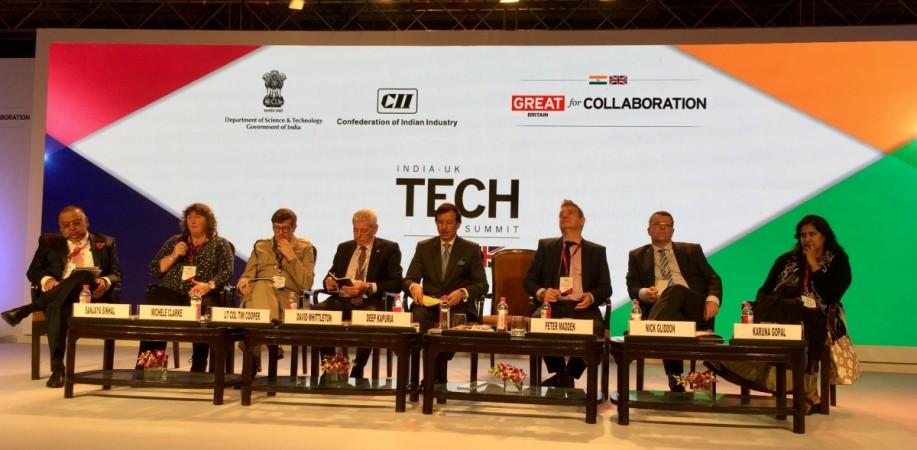
The buzzword at the India-UK Tech Summit has been 'Smart Cities'. Not because the British delegation sees this as a new way to recolonise India, but because it leads the way globally and stands to gain commercially if it can partner PM Modi's smart cities initiative.
While India may have woken up late to the challenges of urban migration and arrived late to the party, it is also paradoxically early: unlike UK, and other developed countries that embarked on their smart city programmes after urban areas had seen large-scale influxes, India is still at just 35% urbanisation and may actually be just in time.
The leader of the UK delegation and the very visible Liam Fox, MP and UK's Secretary of State for International Trade, proudly stated that the standards set by British institutions are adopted all over the world and that India's smart cities programme represents business potential in excess of 2 billion pounds for UK.
But he did admit that the scale of involvement will be huge and one wonders if there is accurate realisation of the enormity of the task ahead for, as Rao Inderjit Singh, Minister of State (Independent Charge) for Ministry of Planning and Minister of State, Urban Development, reminded the packed hall: "For 1000 years, the village was the nucleus of life in India. We missed the industrial revolution which originated in the UK and which probably makes it the leader in smart city development today...With increasing urban migration, we need to provide a better quality of life in our cities. By 2050, 60% of India will be living in cities."
Though he did add a post-script that this could be an under-estimation. While the Minister seemed to hint that the outcome of the programme could determine the Modi Government's fate in the next parliamentary elections of 2019, other speakers were a lot more grounded.
The Managing Director of IL&FS, Hari Sankaran, was pithy and highlighted three areas that will be the focal points of all smart cities: utilisation of life spaces, productivity and employment generation. This was a thread that Prof Michele Clarke, University of Nottingham, would return to in her comments when she recalled Chennai which has seen both water shortages and surplus leading to floods. Her concern was that if urban planners do not put citizens first, what difference would it make to the community and how would success be measured?
To this, Sanjay Sinhal, CEO Secure Meters, mentioned examples from both Bristol and his home town, Udaipur (which apparently has more tourists than permanent residents) and is dependent on its lakes to remain attractive. While he echoed Sankaran's focal areas, he also stressed upon localising solutions and not just importing them. "If we could make RO systems, inverters and diesel generators history, that would be a start to smart cities," he asserted.
While Peter Madden, CEO of Future Cities Catapult, that has been working with local governments and enterprise in Kolkata and Pune talked of integrated systems between transport and energy demand that would optimise utilisation of infrastructure and resources, the President of Foundation for Future Cities, Karuna Gopal, took a somewhat contrarian view and wished for many more than 100 smart cities. In doing so, she lucidly identified three potential areas of collaboration between UK and India:
- Healthcare: collaborative platforms to manage healthcare data and implement visualisation protocols.
- Open data: standards and inter-operability where UK is setting global benchmarks.
- Integrating smart systems.
In response, Nick Gliddon, the India-based Director, Vodafone Business Services, explained how Vodafone looked not just at cities, but also at connecting citizens, utilities, enterprises and also urban and rural areas. He also showcased Pune and Bangalore which are innovation anddevelopment hubs for Vodafone.
But it was left to Lt Col Tim Cooper, Army Adviser Cyber and Comms, Dept. for International Trade, to sound a note of caution: "Smart cities have to be secure first." He dwelled on how UK was beefing up its cyber-security investments to deter states, criminals and hacktivists and to ensure that new technologies are secured so that entire cities don't go down.
Whatever may be the outcome of dialogues between the two Governments, the delegation from UK is leaving no stone unturned to show that it means business when it comes to smart cities in India.










![BJP fields Tashi Gyalson for Ladakh; drops sitting MP [details]](https://data1.ibtimes.co.in/en/full/797185/bjp-fields-tashi-gyalson-ladakh-drops-sitting-mp-details.jpg?w=220&h=138)


